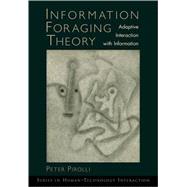
| Information Foraging Theory: Framework and Method | |
| Elementary Foraging Models | |
| The Ecology of Information Foraging on the World Wide Web | |
| Rational Analyses of Information Scent and Web Foraging | |
| A Cognitive Model of Information Foraging on the Web | |
| A Rational Analysis and Computational Cognitive Model of the Scatter/Gather Document Cluster Browser | |
| Stochastic Models of Information Foraging by Information Scent | |
| Social Information Foraging | |
| Design Heuristics, Engineering Models, and Applications | |
| Future Directions: Upward, Downward, Inward, and Outward | |
| Table of Contents provided by Publisher. All Rights Reserved. |
The New copy of this book will include any supplemental materials advertised. Please check the title of the book to determine if it should include any access cards, study guides, lab manuals, CDs, etc.
The Used, Rental and eBook copies of this book are not guaranteed to include any supplemental materials. Typically, only the book itself is included. This is true even if the title states it includes any access cards, study guides, lab manuals, CDs, etc.